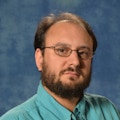Jason Dworkin, Ph.D.
Chief, Astrochemistry Laboratory Solar System Exploration Division, NASA Goddard Space Flight CenterJason Dworkin’s website
SCOL Project: Planetary Context for Origin of Life Experiments
A little over 4.5 billion years ago, our solar system was a disk of gas and dust, newly collapsed from a molecular cloud, surrounding a young and growing protostar. Today most of the gas and dust is in the spectacularly diverse planets and satellites of our solar system, and in the Sun. How did the present state of the planetary system come to be from such undistinguished beginnings? Clues to answer this profound question are found both in the remnants of the formation of the planets—other planets, comets, asteroids, and their meteorites and from careful laboratory simulations of the chemistry on primitive bodies. We will use modern analytical techniques in the Astrobiology Analytical Laboratory at NASA Goddard Space Flight Center to study organic chemical models of the origin of life in collaboration with other Simons Investigators. We will then compare the compounds in lab experiments with our parallel studies of extraterrestrial samples. By comparing relevant laboratory simulations prepared under controlled conditions with primitive materials which have been altered and contaminated, we will understand the chemistry that led to the origin of life soon after the accretion of our planet.
Bio:
Jason Dworkin began research into the origins of life with J. Oró at the University of Houston, where he interned to investigate the prebiotic syntheses of amino acids and co-enzymes. He completed his PhD in biochemistry under S. Miller at UCSD where he investigated pre-RNA nucleobases. He then carried out postdoctoral research at NASA Ames under L. Allamandola and S. Sandford studying complex organics from UV processed interstellar and cometary ices in the laboratory. He founded the Astrobiology Analytical research group at NASA Goddard Space Flight Center to study extraterrestrial organic compounds relevant for the origin of life via analytical chemistry. He is currently Chief of the Astrochemistry Branch at NASA Goddard and the Project Scientist for the OSIRIS-REx mission, which launches in 2016 to return samples of primitive asteroid RQ36 in 2023.